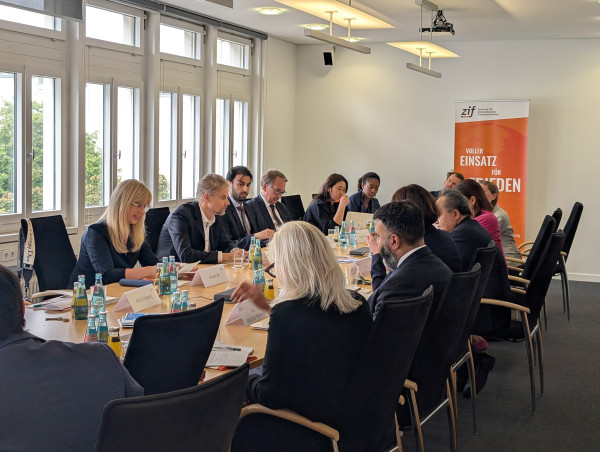Humanitarian aid at a crossroads: ZIF XChange brings international actors together for dialogue

On 9 July 2025, the Centre for International Peace Operations (ZIF) held a high-level event entitled ‘(Humanitarian) Aid at a Crossroads: Challenges and Opportunities for Established and Emerging Actors’ as part of its ZIF XChange dialogue series. Representatives from politics and government, international organisations and embassies based in Berlin discussed current challenges and future prospects for humanitarian aid.
The event was opened by Renata Alt, former chair of the German Bundestag's Committee on Human Rights and Humanitarian Aid, and Georg Siep from the Federal Foreign Office, who is responsible for international humanitarian organisations and the multilateral organisation of humanitarian aid. In their introductory keynotes, both emphasised the need to critically examine existing structures and develop new ways of working together.
The discussion focused on the increasing strain on the international humanitarian system. Drastic budget cuts are forcing many organisations to review their activities for efficiency and potential savings. At the same time, the need for humanitarian aid is growing in the face of ongoing global crises such as armed conflicts, climate change and economic instability.
Participants warned against an uncoordinated withdrawal from crisis contexts, especially where there is a lack of media attention. Such a withdrawal would contradict the humanitarian principle of ‘leave no one behind’. In addition, so-called donor fatigue was identified as a serious threat to the stability of multilateral structures. Reform and diversification of the donor landscape was considered urgently necessary.
Another focus was on the increasing role of private actors in humanitarian aid, for example in rebuilding infrastructure in post-conflict countries. This development offers opportunities, but also raises questions regarding transparency and accountability. In addition, the importance of early exit strategies was emphasised in order to enable the transition to other forms of support and promote sustainable solutions. In this context, the HDP nexus was mentioned as a guiding concept to ensure greater integration of humanitarian aid, development cooperation and peacekeeping. The role of regional humanitarian mechanisms – such as ECHO, the ASEAN Coordinating Centre for Humanitarian Assistance on Disaster Management (AHA Centre) and the African Humanitarian Agency – was also highlighted as increasingly relevant.
Participants included representatives from UN organisations, embassies and the Federal Foreign Office. The intensive exchange underscored the importance of interdisciplinary perspectives and international cooperation for the further development of humanitarian strategies